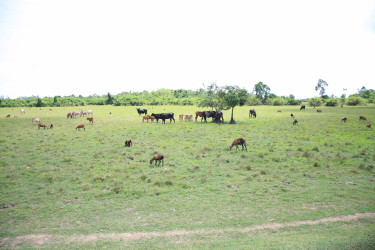Last weekend, the members of the West Berbice Sheep and Goat Farmers Association were reflective rather than high-spirited as they celebrated their 8th Annual Livestock Exhibition.

Noel Holder
West Berbice is the single largest region for the rearing of sheep and goats in Guyana. But the members of the association, a few of whom own upwards of 1,000 head of livestock, have become regular targets for thieves who pay clandestine visits to the farming communities at night and make off with more than a dozen sheep and goats at a time.
An executive member of the association who agreed to speak with this newspaper on condition of anonymity said the rustling has reached a point where it is beginning to force some farmers out of business. And while at last Sunday’s event Agriculture Minister Noel Holder had said that his ministry would move to introduce a Praedial Larceny Bill in the National Assembly shortly, Stabroek Business was told that the law notwithstanding, enforcement could be a problem.
The theft of sheep and goats, this newspaper understands, has become a well-rehearsed operation that can net a single rustler up to $500,000 per hustle. The association’s executive told Stabroek Business that the thieves usually rent cars at around $10,000 per trip and make their way to a selected sheep and goat-rearing community. They strike at night, raiding pens and bundling up to around 14 animals into a car before making off. Once they arrive at their destinations the cargo is unloaded and the car washed and returned to its owner.
It is the belief of the farmers that the stolen animals are taken mostly to the village of Mon Repos on the East Coast Demerara where they are either slaughtered for sale or disposed of live. Mon Repos Market, incidentally, is known for its vending of mutton and goat meat (chevon).
The association officials believe that the farmers have done everything that they can, their most recent initiative being to collaborate with the Guyana Livestock Development Association (GLDA) and the police to devise a strategy to respond to the problem. There appeared to be no shortage of willingness on the part of former crime chief Leslie James to help fashion a response to the problem, but farmers said the intervention of the police made no real difference.

The situation reached the height of absurdity when two animals retrieved from Mon Repos and lodged at the BV Police Station disappeared from under the noses of the station detail before arrangements could be made to have then returned to the owners.
In another case of stolen livestock, the matter has dragged on so long that animals, which were being held at the Fort Wellington Police Station, actually died there. In one known case, farmers have had to trek to the same police station every day since May to feed their impounded livestock.
The association’s executive member who spoke with this newspaper believes that more can be done to curb the practice. He said that since it is likely that most if not all of the stolen meat is sold at the Mon Repos market, butchers must be

made to produce traceable evidence like receipts of purchase or of ownership before they are allowed to trade.
Additionally, the informant cautioned that meat from animals stolen and slaughtered aback of Mon Repos was likely to have safety and health issues.
The futility associated with legal resort has compelled farmers to embrace the option of settlement, that is,

arrangements for some sort of restitution once the thieves are caught. The association has been coming under pressure from its members in circumstances where it insists on resort to the courts in cases where the proceedings are protracted and the outcomes uncertain.
Raids can occur up to three times a week, mostly between Wednesdays and Fridays.
According to the association’s spokesperson, the visiting thieves are linked to West Coast Berbice insiders, who provide strategic information to the raiders.
Currently in its eighth year, the association provides membership for some of the biggest farmers in the country. Heavy losses to rustling, the spokesman said, have prevented the multi-million-dollar industry from satisfying its market ambitions both at home and abroad.
All is not doom and gloom, however. The association acknowledged the support it receives from the Food and Agriculture Organization, the GLDA and the Caribbean Agricultural Research and Development Institute in its efforts to break into regional market and to improve the breeding environment by supporting the development of pasture lands. Still, the association said, the theft of livestock has now become economically debilitating and is causing farmers long associated with the sector to think again about just how much longer they will stay in the business.




